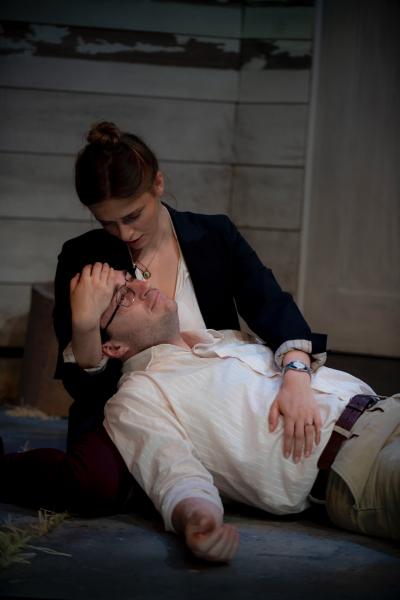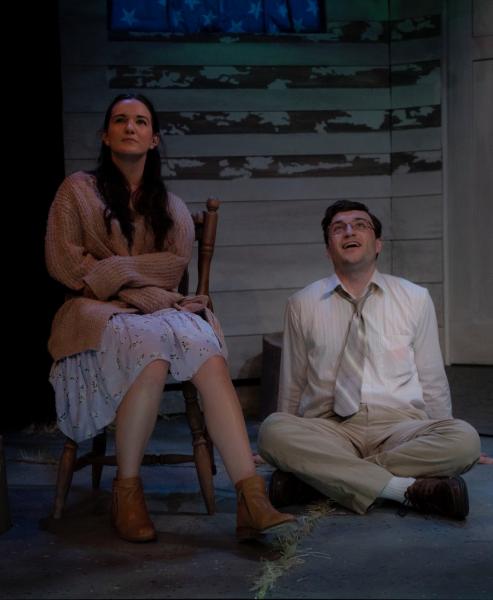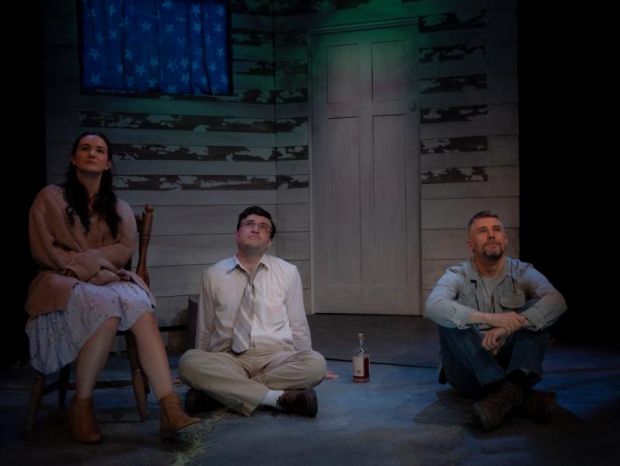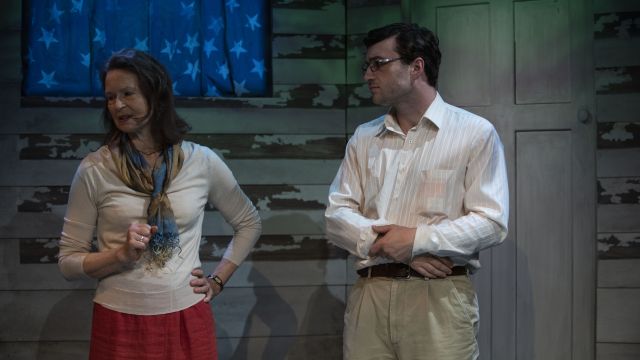Heroes of the Fourth Turning
In the yard of a shack in Wyoming, in 2017, a year into the Trump presidency, four friends sit and talk. The shack itself (design by Louise McCarthy) features a pattern to its peeling paint and one curtained window: it’s the Stars and Stripes. When the light beams from within, the Cross is outlined on the door.
Teresa (Annie Shapero) and Kevin (Darcy Kent) are recent graduates of Transfiguration, a conservative Catholic college. Don’t get the idea that ‘conservative Catholic’ means what it does in, say, Portrait of the Artist as a Young Man. No. At Transfiguration the students learn about and discuss Martin Heidegger, Hannah Arendt, Gerard Manley Hopkins, Flannery O’Connor, and the like, have conversations in Latin, and ‘wilderness training’ – and we can infer, are inculcated with an oppositional, righteous superiority to the outside world.
Justin (Charlie Cousins) is older, quieter, much less to say – at first - something of an isolate, who graduated some years back. He’s almost the carer of Emily (Mollie Mooney), chronically ill, and intermittently wracked with pain. It’s clear that Justin loves her. Of all the characters, she is the most open, the least dogmatic even if what she does in her life is in contradiction of her beliefs – and she knows it. Kevin, meanwhile, is in a boring job that he hates and is sadly, desperately sexually frustrated, his self-esteem zero, the faith and beliefs learned at the college somehow no longer a support. Kevin’s heavy drinking and too frank over-sharing provide much of the play’s comic relief.

Emily is the daughter of new college president Gina (Margaret Mills) and the group is ostensibly there to congratulate Gina, the first woman president of Transfiguration College. Strangely no one seems to think that is too ‘progressive’.
Heroes is a challenging and much lauded 2019 play about American soi-disant ‘conservatives’, their beliefs and politics. The playwright asks us not to empathise with the characters. In my case, no chance. Which is not to say that it is not instructive to listen to them: they are absolutely believable and horribly fascinating people, as we see them represent (with variations) an ideology that is way to the right on the political spectrum. These are folks who voted for Trump – some reluctantly, one enthusiastically, but driven to Trump by their visceral loathing for Hilary Clinton, the corrupt faux ‘liberal’ – and Obama. A crucial, white hot issue is Roe v. Wade, which they want repealed.
Rather glamorous, well-dressed Teresa now lives in New York and is the closest to being an intellectual; she writes a tendentious right-wing blog and is an admirer of Steve Bannon. She is the character who fiercely espouses and explains the ‘Fourth Turning’ theory with absolute certainty. It’s a theory laid out in a 1997 book by Neil Howe and William Strauss. They argue that there are four recurring generational periods, each of twenty years, and culminating in a ‘turning’. In our time, post WWII, the first two decades were the post-war high. Second, the Awakening of the 60s and 70s, when the Boomers turned against their forebears. Third, the Unravelling, when all that questioning, and freedom became dangerous, undermining the family and faith. And now, the Fourth Turning: Crisis – an era a destruction – war or revolution. There are constant references in the play, in all seriousness, to ‘the coming war’. This war will be, or even is, between the God-fearing conservatives and the ‘liberals’, pro-abortionists, unionists, LGBTQ advocates and the like. So there. Arbery’s characters will be the ‘heroes’ because they are, quite simply, right. Their beliefs, their faith, their redemption through Jesus, all put them on the side of victory. Marching mobs with torches and Confederate flags are not the enemy.

We listen to these characters, in various combinations, argue in real time for the next two and half hours. They are insightfully written and beautifully performed: all five (including Gina, who appears in Act II) are different but recognisable human beings, not mere mouthpieces, and their discussions, argument, bickering, teasing, confessions and revelations are the play. There is no ‘story’. If intellectual argument (albeit driven by emotion) is not your thing, this is not for you. But the play is far more than mere talk. The insightful writing lets us glimpse why these ideas are meaningful, even necessary to these people. The play is an unusual insight into the thinking of these conservatives, characters we rarely if ever see on stage except as caricatures or ‘the enemy’. They speak for themselves, and the only challenges come from within. No ‘liberal’ or leftist or culture-cancelling snowflake or LGBTQ rep comes on stage to denounce them or show them up. Nevertheless, the trick with Will Arbery’s writing is that every now and then, you’re drawn in by something a character says, and you find yourself thinking, ‘Well, that’s true…’
Gina, the mentor to all of them, gets a beautifully modulated performance from Margaret Mills. Gina is quiet, level, polite – and chilling. We hear, ‘Oh, I hate Trump – but I hated Obama.’ (Unnecessary to say why.) Or ‘Now that we’ve got the Supreme Court back…’ ‘They already got a president of the nation.' It is Gina who ticks off the rabid Teresa for going to unnecessary extremes and associating with Bannon. Far too vulgar and opportunist for Gina. And Annie Shapero is powerful indeed when her very articulate Teresa goes to extremes. It’s a standout performance, one that is totally in-your-face, unafraid to give the audience a horribly dogmatic, arrogant, self-righteous, bullying, and loathsome character. When she rails against abortion, calling it ‘murder’ and ‘genocide’ with ironic reference to Nazis, I couldn’t help thinking that Teresa couldn’t care less about the babies once born and that if she fell pregnant, she’d be down to the abortion clinic the next minute.

All that said, and duly recognising the play’s many awards, attention, and high praise – and high seriousness – I would question its length and the sense that it seems to end several times – although the final ending, a scream of pain, outside of dogma, Jesus and the one true faith, reminded me of Jesus himself, ‘Oh, God, my God, why hast Thou forsaken me?’
Red Stitch is to be commended for courageously putting on this risky but important play. It surely isn’t preaching to the converted.
Michael Brindley
Subscribe to our E-Newsletter, buy our latest print edition or find a Performing Arts book at Book Nook.

